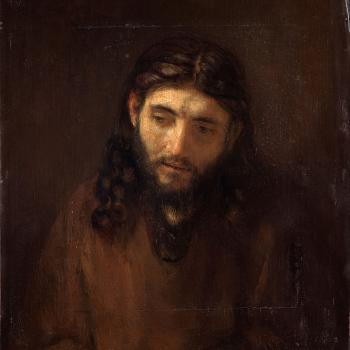Jesus was neither “confused” nor did He wonder what His mission was at any time. The image is a detail from The Temptation of Christ, by Sandro Botticelli (1445-1510) [public domain / Wikimedia Commons]
An article caught my eye, entitled, “The Identity Crisis of Christ . . .”: over on the “Progressive Christian” channel at Patheos. It comes from David R. Henson, who received his Master of Arts from Graduate Theological Union in Berkeley, California. He is priest in the Episcopal Church, but he writes in his Bio: “This is a personal blog and does not necessarily reflect the views or opinions of the Episcopal church or any of its dioceses, parishes or ministries with which I am affiliated.” His words will be in blue.
* * * * *
David writes in his article:
Then there had been the encounter with the Gentile woman, whose response had completely rearranged his understanding of the breadth of his own ministry and purpose. It called into question things he had been taught his entire life by rabbis, his family, and his culture in general.
So in a relatively short span of time, Jesus had been called crazy by his family, publicly disowned them in response, been run out of his childhood home without honor, lost his foundational mentor to a state-sponsored execution, and had his missional identity turned upside-down by a non-Jewish woman.
It is against this backdrop that Jesus asks the question of his friends, his new family.
“Who am I?”
Set in this context and at a critical turning point in the gospel of Mark, this is a fundamental question of identity, if not outright crisis — not just for the disciples but for Jesus himself.
. . . like all humans, he was finite and limited.
Like us, Jesus didn’t have some a priori understanding of who he was. He had to discover who he was.
The Bible teaches that Jesus was omniscient; among His many other divine attributes. Most Christians throughout all history have believed that Jesus was omniscient. It’s only since the onset of theological liberalism in the 18th century that anyone started questioning this. For Catholics, the issue is a closed one. Fr. William Most wrote in his article, Jesus’s Knowledge:
Pope Pius XII, in his great Encyclical on the “Mystical Body,” on June 29, 1943, rejected all such charges. He taught: “By that blessed vision which He enjoyed when just received in the womb of the Mother of God, He has all the members of the Mystical Body continuously and perpetually present to Himself.” In other words: His human soul saw the vision of God at once, and in it all knowledge is at hand. In another Encyclical, “Sempiternus Rex,” in 1951, the same Pope complained many were not accepting his teaching. Then in still another Encyclical, “Haurietis aquas,” in 1956, he clearly repeated his earlier teaching. Further, on July 24,1966, the Congregation for the Doctrine of the Faith under Pope Paul VI, complained that many were still not accepting. Clearly, the repeated teaching shows the Church means to make this definite and definitive, namely, that the human soul of Jesus, from the first instant, saw the vision of God, in which all knowledge is accessible.
See also a much longer related article by Fr. Most: “Jesus Christ Yesterday, Today and Forever.” But it’s not just Catholics who believe these things: so do Orthodox and historic Protestants. I get into some of the intricacies of the Two Natures of Christ (the Hypostatic Union) — including the obligatory 50 cent theological terms like “communicatio idiomatum” — in the first chapter of my book, Theology of God. I used to have a version of that chapter online, and so I dug it up from Internet Archive for this post. As usual, I hand out the information for free, rather than requiring anyone to purchase a book (even if mine are available as e-books for just $1.99 or $2.99). I didn’t devote my life to Catholic apologetics in order to become a rich man.
With this background, here is the rest of the exchange. Our friend appears to not think very highly of apologists, judging by his parting sh, er comment.
[Me] If Jesus wasn’t God, as the New Testament plainly reveals Him to be (but ah; one has to believe that it is inspired revelation), then He would be a liar or lunatic, in which case I can see how He would have been very confused, or was deliberately confusing others (if a liar).
Nothing I’ve written here denies or argues against the divinity of Jesus.
But to be orthodox one must wrestle with his humanity and the intersection of that with his divinity. The suggestion that Jesus never experienced confusion is an odd one if we are to believe his full humanity.
This position that Jesus was supposedly “confused’ is Nestorianism at best. Chalcedonian Christology holds that Jesus had no such confusion. He always knew Whom He was because He remained 100% God just as He was 100% man.
Since He was God as well as man, He was omniscient, thus precluding the confusion that you refer to. But it was not required for Him to be “confused” in order to be human. He suffered as we do, and had our experiences in many ways, but concupiscence and confusion and sin were not among those common experiences.
These same sorts of errors were a large part of the plot of The Last Temptation of Christ. Many Protestant apologists / writers (e.g., the Lutherans Bob and Gretchen Passantino) noted at the time how it had a deficient Christology.
It’s not Nestorianism. I don’t suggest there are two different Jesuses. I’m saying most folks (see your comments) ignore the implications of his humanity, and by doing so, divorce Jesus of his humanity and thus become Nestorians. (See how easy it is to throw around heresy charges instead of stating one’s thoughts clearly?)
Jesus himself says his knowledge is limited (only the Father knows the day and hour, not even the Son) and Paul tells us he didn’t seek equality with God was possible. This is part of the self-emptying as it were that comes with being human and the Incarnation.
The pairing of confusion with sin and sexual desire is an oddity.
Mental suffering was very much part of his suffering if we believe the Scriptures.
This notion of the “limited knowledge” of the “human” Jesus (or, “confusion” in your article) was indeed an aspect of the historic debates over Nestorianism. E.g., New World Encyclopedia: “Nestorianism” (my bolding):
History
Nestorius (c. 386–c. 451) was a pupil of Theodore of Mopsuestia in Antioch, and later became Patriarch of Constantinople. He taught that the human and divine aspects of Christ were distinct natures, not unified. He preached against the use of the title Mother of God (Theotokos) for the Virgin Mary and would only call her Mother of Christ (Christotokos). He also argued that God could not suffer on the cross, as he is omnipotent. Therefore, the human part of Christ died on the cross, but not the divine.
His opponents accused him of dividing Christ into two persons: They claimed that proposing that God the Word did not suffer and die on the cross, while Jesus the man did, or that God the Word was omniscient, while Jesus the man had limited knowledge, implied two separate persons with separate experiences.
I didn’t pair confusion with sin and sex. I simply mentioned those things in passing because they (esp. concupiscence) are commonly asserted by those who also assert limitations of knowledge in Jesus.
I wrote about the passage you refer to and about the supposed “ignorance” of Jesus in a chapter of my book, Theology of God:
Matthew 24:36 [RSV] But of that day and hour no one knows, not even the angels of heaven, nor the Son, but the Father only. (cf. Mk 13:32)
. . . It had to do with a particular sense of “kingdom” and a manifestation of Jesus’ “coming” in some sort of extraordinary glorified fashion. His hyperbolic expressions, also mentioned, are, on the other hand, easily explained by Hebrew linguistic conventions.
But not knowing the day or hour,(Matthew 24:36), is indeed arguably an instance of His specifically speaking in His human nature (in one limited, specific
sense). But even so, He knew it in His divine nature. I would say it is the distinction between stating a falsehood and the limitations of human nature, even for the Son of God (the incarnation being a “lowering” in certain ways: cf. Heb 2:7, 9).
He could express the latter because it doesn’t contradict what He knows as God the Son, whereas the former (stating a demonstrable error) would be
in contradiction of the hypostatic union, since it would go against His knowing all things (as He does) in His divine nature. The two natures of Jesus preclude His uttering an error. Another option is expressed by some of the fathers:
St. Jerome: Having then shewn that the Son of God cannot be ignorant of the day of the consummation, we must now show a cause why He should be said to be ignorant. When after the resurrection He is demanded concerning this day by the Apostles, He answers more openly; “It is not for you to know the times or the seasons which the Father has put in his own power.” [Acts 1:7] Wherein He shews that Himself knows, but that it was not expedient for the Apostles to know, that being in uncertainty of the coming of their Judge, they should live every day as though they were to be judged that day.
St. Augustine, de Trin., i, 12: When He says here, “Knows not,” He means, ‘makes others not to know;’ i.e. He knew not then, so as to tell His disciples; as it was said to Abraham, “Now I know that thou fearest God;” [Gen 22:19] i.e. ‘Now have I caused that thou shouldest know,’ because by the temptation he came to know himself.
St. Augustine, Lib. 83, Quaest. Q60: That the Father alone knows may be well understood in the above-mentioned manner of knowing, that He
makes the Son to know; but the Son is said not to know, because be does not make men to know.
Lapide presents aspects of both explanations and adds an additional interesting possible interpretation:
You will say, Mark adds (13:32), neither the Son, for so it is in the Greek, Latin, Syriac, Arabic, Persian, Egyptian, Ethiopic. Various answers are given. The best is that which is common among the Fathers. It is that the Son, both as God and as man, by infused knowledge, knows the Day of Judgment and of the end of the world, for it pertains for Him to know this, inasmuch as He has been appointed the Judge of the world. But Christ denies that He knoweth this as man, and as He is God’s messenger to us, because He did not know it so that He could reveal it to us, or because He had not been commissioned by the Father to reveal it to us. As an ambassador who was questioned concerning the secrets of his prince would reply that he did not know them, although he did know them, because he did not know them as an ambassador. For an ambassador declares only those things which he has a commission to declare.
Christ’s meaning then is, “God only knows what year and day and hour the end of the world and the Judgment shall be. And although God has caused
Me, Christ, as I am man, to know the same, as I am that one man who is united to the WORD; yet as I am the Father’s ambassador to men, He has not willed Me to make known that day, but to keep it secret, and to stir them up continually to prepare themselves for it.” There is a like mode of expression in St. John 15:15.
There are some who explain thus: that Christ, qua man, knoweth not the Day of Judgment; but that He knoweth it as He is the God-man. That is to say, Christ as man knoweth it not by virtue of His humanity, but of His divinity. So St. Athanasius (Serm. 4, contra Arian.), Nazianzen (Orat. 4, de Theolog.), Cyril (lib. 9, Thesaur. c. 4), Ambrose (lib. 5, de Fide, c. 8).
Again, Nestorianism is about two separate Jesuses (humanity and divinity not in union), essentially splitting the human and divine into separate selves. What I’ve written here doesn’t suggest it either.
Nestorianism was rooted in the reluctance to understand God as being able to suffer and die (to experience the unpleasant bits of humanity). Your argument is an extrapolation of that Nestorian argument — i.e. that God cannot suffer mentally or emotionally, etc. Hence, the inability to see a God who suffers [above, I wrote in relpy, “He suffered as we do,” so such a conclusion about my supposed view is quite odd and curious; God the Father, however, experiences or “has” no emotions, which is the de fide dogma of impassibility] ” is at the very root of Nestorianism. One might well suggest your argument is little more than veiled docetism.
But we’re arguing about heretical labels at this point and not the actual content of the post above and what it means for Jesus to be fully human.
I noticed in your email address you consider yourself an apologist, which is another way of saying you have to have the last word, so I offer it you.














